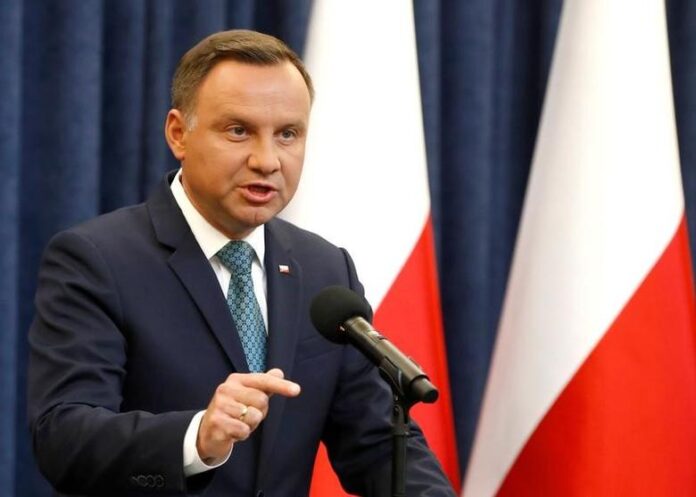Poland’s President Andrzej Duda said on Monday he will sign into law a controversial bill creating a commission to investigate Russian influence on Polish politics that could ban people from public office for a decade, according to Politico.
Duda and the Law and Justice (PiS) party government say it’s an effort to root out the Kremlin’s agents in Poland, but the opposition warns the commission is aimed at harassing political rivals — especially Donald Tusk, a former prime minister and European Council president who heads the opposition Civic Platform party — ahead of this fall’s pivotal parliamentary election.
The decision is likely to worsen already fraught relations between Warsaw and Brussels, with the European Commission freezing billions in EU pandemic recovery cash over worries the Polish government is backsliding on the bloc’s democratic principles.
The commission law was narrowly approved by the Polish parliament late Friday after a heated debate; Duda’s decision to rapidly sign it into law dashed hopes that he would distance himself from the law.
Duda did say he would also send the law to be examined by the Constitutional Tribunal — a top court dominated by PiS loyalists — but that won’t prevent the commission from beginning work.
“People have the right to know,” Duda said in a broadcast to announce his decision, adding: “The public should form its own opinion on how … those elected in general elections … understood the interests of the Republic of Poland, whether those interests were actually properly executed.”
The opposition denounced the commission as a political weapons designed to cow PiS’s rivals ahead of an election it might lose.
“President Andrzej Duda has seriously weakened our country today, internally and externally; he has decided to set off a Polish civil war,” said Szymon Hołownia, head of the Poland 2050 opposition party.
Borys Budka, one of the leaders of Civic Platform, warned that anyone joining the commission should face prosecution. “This commission is not supposed to explain anything, decide anything, judge anything, it is only supposed to be a hammer against the opposition,” he said.
The Left opposition party called for Duda to be put before the State Tribunal, a body that is supposed to judge politicians. “You did something absolutely disgraceful for democracy in our country,” said Left leader Włodzimierz Czarzasty.
The nine-member commission will be chosen by parliament where PiS has a slim majority; several opposition parties have said they will boycott the procedure.
It will examine actions that were taken “under Russian influence” from 2007 to 2022 — a period covering the 2007-2015 governments of the Civic Platform party led by Tusk as well as the current PiS administration.
Critics say the commission violates the constitution as its functioning isn’t precisely defined, its verdicts are final, and members of the commission are shielded from any criminal responsibility. All of the country’s intelligence, police, prosecutors and other official bodies are mandated to cooperate with it, and there is no set procedure for deciding who it will investigate.
It can decide to ban people for 10 years from jobs involving the spending of public funds — which would block them from running for office.
The government insists it has no hidden agenda.
“There is nothing to be afraid of,” said Prime Minister Mateusz Morawiecki, adding, “Why is this esteemed opposition of ours, especially Mr. Tusk, so afraid of a commission to verify Russian influence?”
PiS has denounced Tusk’s long-term gas deal, but the country was a big buyer of Russian coal until the full-scale invasion of Ukraine last year, and continued buying Russian pipeline crude until Moscow turned off the taps in February.
Tusk has called for people to hold a mass protest in Warsaw on June 4 — the anniversary of the 1989 partially free election that ended communist rule in Poland.


